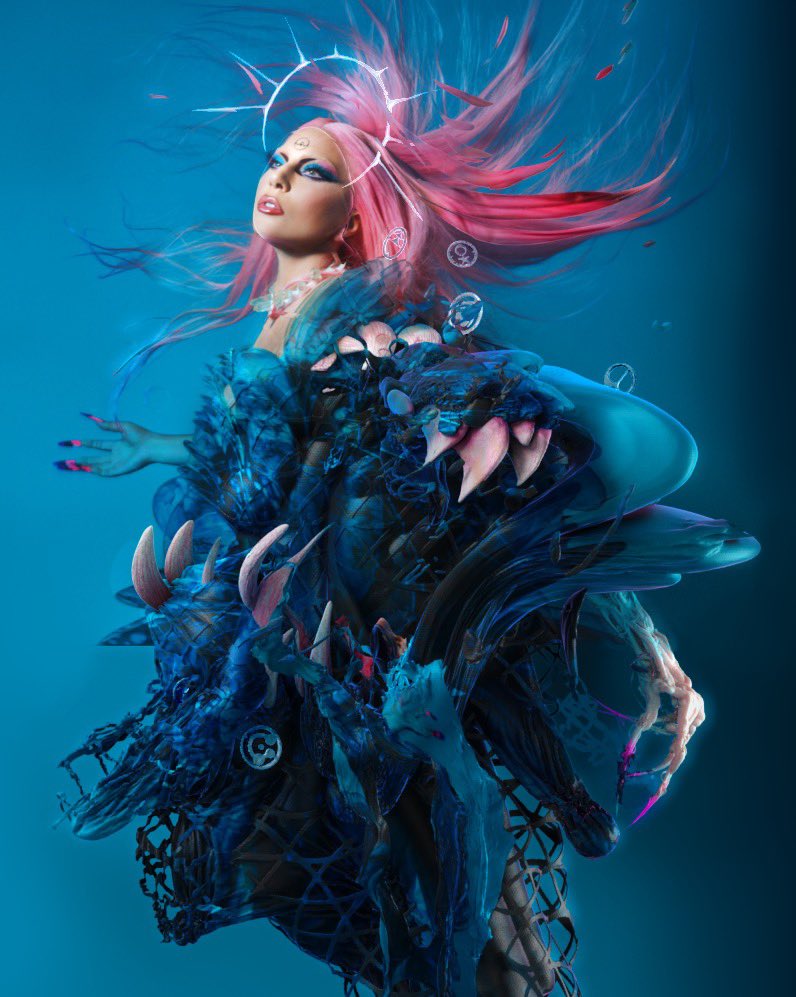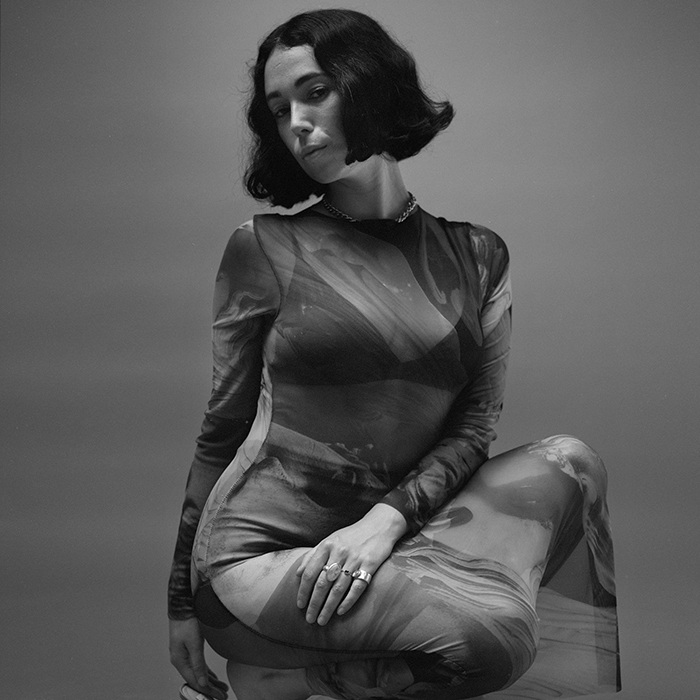Lady Gaga’s ‘Dawn of Chromatica’ remix album is a bonkers blueprint for the future of pop music
Image: Sam Rolfes
“The Chromatica remix album is so f*cking fuego music is life.” With a single tweet in early August, Lady Gaga sent pop music into overdrive. Until that point, the long-rumoured remix album had been the stuff of legend and sketchy insider information, promising a resurgence of Gaga’s pop persona like we had never seen before. There’s no arguing that Gaga is one of the most, if not the most, crucial cultural figureheads of our time. Crash landing from the cosmos in 2008, her avant-garde public image and stage persona reformulated pop stardom into performance art. The chameleonic reinventions and boundary pushing imagery would set the standard for the contemporary pop star, establishing a template that placed performativity and iconography at the forefront. But by 2013, the post-Lorde landscape dimmed the lights on the theatrics and by 2018, Gaga had released three consecutive albums that eschewed her signature dancepop for collections of jazz standards and Americana.
“I don’t know that I was dancing,” said Gaga, reflecting on that phase in an interview with Zane Lowe. And while Cheek to Cheek, A Star Is Born, and to a lesser extent Joanne, brought about an undeniable renaissance of Gaga’s mainstream appeal, it was becoming increasingly obvious that the world was once again ready to just dance. After all, she is the person responsible for reviving the pulse of the four on the floor on Top 40 radio, subsequently changing the course of pop music. Her retreat from the electronic sound and unconventional public image was a necessary course correction until it wasn’t, which is why when news broke that she was working on a project with late pop pioneer SOPHIE, it seemed too good to be true. That project would eventually manifest (sans-SOPHIE) as her sixth studio album, Chromatica. Helmed by producer Bloodpop and featuring an army of the likes of Tchami, Skrillex and Madeon, Chromatica is Gaga’s reclamation of a dancefloor that she created. A collection that pays homage to the pulse and energy of 90’s dance music, it celebrates the queer exhilaration of house and disco in a way that feels both strangely familiar and entirely fresh. In the absence of SOPHIE though, the anticipated hyperpop-Gaga incarnation never materialised. It should have been expected. For all the outward idiosyncrasies, Gaga the musician has always walked the tightrope between the experimental and the accessible. Even through the camp theatricality of Government Hooker or Venus, she’s maintained a sound rooted in Top 40 appeal. Her and Bloodpop’s new remix album, Dawn of Chromatica, breaks this boundary at last. It’s Gaga’s most distinct somersault into full on outré pop maximalism, and the closest she’s come to connecting the music to the meat dress.
It’s impossible to understand Dawn of Chromatica as separate from its progenitor. Packaged as a high concept sci-fi epic with Chromatica as an alien planet plastered in 90’s rave posters and acrid clubkid aesthetics, Chromatica is an alternate reality, a state of mind that promises escape from the dregs of reality. “Chromatica is this beautiful abstraction of my perception of the world… This is not dystopian or utopian, this is how I make sense of things,” Gaga explained. For her, Chromatica was a process of healing through music, a reinvigoration by way of sound itself. “That sound, sine, from above is what healed me to be able to dance my way out of this.” Considering Chromatica as a state of mind accessible to anyone, it renders as her most open-source work to date. The endless roster of producers over which Chromatica changed hands alludes to this, and its final form is the conclusion of Gaga’s search for the sine that would make her dance again. As such, Chromatica’s music lends itself to interpretation and reinterpretation far more than her unequivocal, auteur driven work in the vein of Born This Way. This is essential to Dawn of Chromatica. The alternate dimension of Gaga’s abstraction, Dawn is the cybergoth GenZ little sister to Chromatica’s millennial nostalgia. Not so much a traditional remix album as a companion piece, Dawn is very much a completion of the sine wave, bridging what began at Gaga with the subsequent lineage of left-field pop artists who are destined to succeed her. Featuring the current It-list of hyperpop and underground club music, Dawn reimagines Chromatica’s songs by way of each of these artists’ signature styles and aesthetics. It’s a celebration of the new guard of pop provocateurs and queer creative forces who owe it to Gaga, and mainstream pop’s most ardent embrace of the underground in recent memory.
For casual pop fans, this will be challenging. Those looking for radio-friendly club versions of their favourite songs would have better luck sourcing bootlegs on SoundCloud. But for those invested in the future of pop as art medium, Dawn is likely to be satisfying. Dawn runs through an endless runway show of contemporary styles, from American hardcore to bass heavy post-club, yet feels oddly cohesive in the way that its remixers can be linked back to Gaga. Some completely rewrite the tracks in their own image, as SHYGIRL does with Sour Candy and Ashniko on her obnoxiously good version of Plastic Doll. Others attempt to reimagine their source material as actual collaborations. 911 throws Charli XCX back into the territory of Pop2, and her lyrical contributions may possibly be some of her finest pop writing since that EP. A.G Cook’s production honours 911’s retro-techno DNA, but mutates it toward the liquid rubber of PC Music hyperpop in the closest we may get to experiencing SOPHIE’s Chromatica. Dorian Electra’s Replay is an easy standout, a ridiculously good pastiche that synthesises deep house and cybergrind. Electra’s guest verse adds to Gaga’s lyrics in a way that flows most like an actual duet, outside of Rina Sawayama’s guitar riffed and drum filled take on Free Woman. Bree Runway’s additional verse on Babylon makes you wonder why she was never featured on the track in the first place. She intensifies the strut of Babylon’s Harlem house beat in a way that will likely make the original sound significantly emptier on future listens. Fun Tonight with Pablo Vitar presents an irony not present in Gaga’s discography since The Fame, an irreverent humour that takes arguably Chromatica’s most morose case study and turns it into the sonic equivalent of a caipirinha.
Planningtorock and Doss present the most traditional ‘remixes’ by ignoring the pop structure of their source material, extrapolating on specific motifs rather than keeping the lyrics intact. 1000 Doves takes flight as a synth driven eurodance epic that recalls the cry-at-the-party energy of Robyn, while Doss’s Enigma trades the original’s Studio 54 drag for bassy, grimy subterranean tech-house. COUCOU CHLOE’S Stupid Love also fits the straightforward remix category, though it’s sinfully short lived. It cries out for more room to expand CHLOE’S filthy jacking house adjacent deconstruction of the song. Elsewhere, Chester Lockhart, Mood Killa and Little Texas take Chromatica’s thesis statement Sine From Above to its most extreme, mutating the dance ballad (and Elton John) into a gonzo hardstyle/dubstep/complextro Frankenstein monster. It’s so incredibly bizarre that it succeeds beyond expectation, somehow taking the concept of the original’s jarring drum and bass outro even further toward complete auditory assault. What’s likely to be Dawn of Chromatica’s most misunderstood moment happens to be its brightest, coming courtesy of Arca’s breathtakingly transcendent rework of Rain On Me. She pulls apart the track and warps Gaga and Grande’s vocals into ethereal, spectral loops and extraterrestrial hooks. On paper, placing Lady Gaga and Ariana Grande’s vocals against KiCk i tracks Time and Mequetrefe seems ludicrous, and to an extent it is, but Arca’s mastery of avant-pop syncopation extracts Rain On Me’s inherent sense of tear-soaked triumph toward preternatural levels of catharsis (also possibly induced by seeing the names ‘Arca’ and ‘Lady Gaga’ on the same song credit).
The cultural significance of this project will likely be overlooked for years to come, similar to her divisive third album ARTPOP. As she prepares to release a second album with Tony Bennett and another bid for a Best Actress Oscar, it’s plausible that this may well be Gaga’s dancepop swan song, as the next chapter of her career sees her delve further into adult contemporary and vocal focussed traditional pop. But in the performance of the Lady Gaga enigma, this is the moment where fantasy and reality have most distinctly collided in a sort of passing of the torch. In so many ways, Dawn feels like the version of Gaga the world expected to see next. And while it may largely exist as fan service, it speaks toward an essential part of the Gaga mythos; her innate understanding of her audience’s outsider experience. She’s always felt like one of the weirdos, embracing the trauma of the lived queer experience with the sort of love and acceptance that earned her the moniker of Mother Monster. If anything, she understands her children like no one else. Dawn of Chromatica is her gift to them for staying the course, even when no one expected to trade in their disco stick for a cowboy hat.
Dawn of Chromatica is released by Interscope. Listen below.




